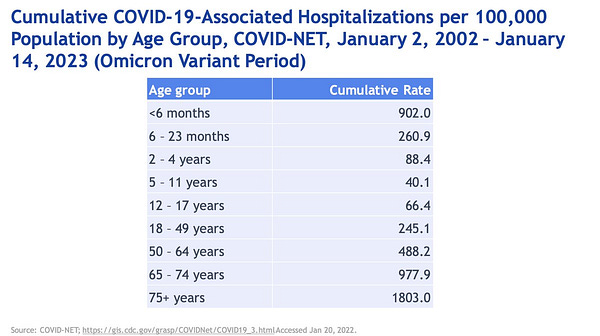Inside Medicine Week In Review (January 28, 2023).
Quick catch up, solid reading recs, and my appreciation to you!
It’s the Inside Medicine “Week In Review”! This is meant to be a convenient way to find what we've covered this week (in case you missed anything or never got around to reading something you’d flagged) and a chance for me to share some good stuff from other writers and outlets (“What I’m Reading”).
This week, Inside Medicine included some personal writing and some intense data/policy deep dives. I enjoyed working on these for you and I hope you found them useful. If so, please “like” and share them! Here’s the week’s haul:
Monday: Data Snapshot: Unnatural Deaths Like Accidents, Trauma, and Overdose Rarely Attributed to Covid.
Tuesday: Field Notes: The deceptively dangerous thing many people do with their medications.
Wednesday: How ER doctors communicate: A look inside a complex and fascinating lingo.
Thursday: Are yearly Covid-19 boosters the best we can do? (Timing boosters: Part I).
Friday: How to stretch our Covid relief dollars with smarter booster campaigns in the future. (Timing boosters: Part II).
What I’m Reading. These are items written elsewhere that I found important and interesting (note: some may be paywalled or require free registration):
Evusheld No Longer Authorized for COVID Prevention. (Ian Ingram, MedPage Today).
Commentary: Monoclonal antibodies (which we doctors call “mABs”—rhymes with labs or tabs) got a lot of hype, especially after former President Trump received them when he got Covid-19 (remember: this was the pre-vaccine era). While these medications did not end up being as effective as hoped overall, some populations certainly benefited from them, especially immune-compromised people. Now, Evusheld has joined the growing list of mABs which have lost their usefulness due to resistant Covid-19 variants.
The Flu-ification of COVID Policy Is Almost Complete. (Katherine J. Wu, The Atlantic).
Commentary: Actually, this piece has a lot of overlap with Inside Medicine over the last couple of days. The idea is that things like annual boosters are easy for people to wrap their minds around. The problem is that Covid is not “yet”the flu, in terms of its predictability and amount of disease it causes.
How the U.S. Lost Years of Life. (Tanya Lewis, Scientific American).
Commentary: This is an area of study for me, as you may know. This is a quick piece and it gives good context about other nations too. It has one topic that I’ve been meaning to write on for awhile—which is that men in the US have been hit hard with all-cause mortality increases, both before and during the pandemic.
Tweet of the week (Yes, I’m still on Twitter, so you don’t have to be):


Note: there appears to be a typo in the CDC slide included in the tweet above. It should read “January 2, 2022-January 14, 2023” (not “2002”).
If you read Inside Medicine, you probably know Benjy Renton—a data guru who helps with this newsletter (Follow him on Twitter, if you’re there). This tweet was a screenshot from the FDA’s vaccine advisory meeting on Thursday. It shows what we’ve been hammering home for a while here at Inside Medicine; the very young and the older populations are the highest risk groups for Covid-related hospitalization. As I wrote this past fall, infants are the group that surprises most people. It is on that basis that I have strongly urged the CDC and others to recommend boosters during the 3rd trimester of pregnancy (the antibodies protect the Mom and baby, and the baby has protection even for a few months after birth as a result).
Thanks for liking and sharing the newsletter every day! That helps the content here gain further reach. And, as always, a special thanks to the upgraded subscribers who make such great comments. Increasingly, that’s the pulse of this newsletter, and I hope to see the community continue to grow so that the conversations can be even more robust.
Also, let me know if you have topics you’d like me to cover.
Have a great Saturday!



Dr. Faust, I would appreciate your take on the Cleveland Clinic preprint article ( https://www.medrxiv.org/content/10.1101/2022.12.17.22283625v1.full ) which (among other things) ostensibly showed an increased risk of SARS-CoV-2 infection with a greater number of COVID-19 vaccinations. This perplexing finding is fueling a lot of anti-COVID-19 vaccine commentary.
If you have already addressed it, I would appreciate a link to that Inside Medicine article (or other source in which you have addressed it). Thanks.
Always a treasure of knowledge and solid no hype reading recommendations. Feel like you and Benjy ought to be related as it seems your two brains are quite alike.